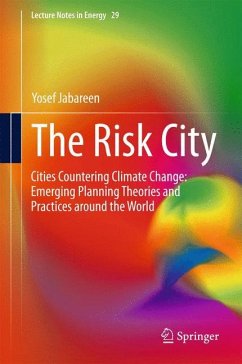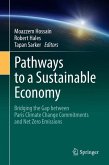Contemporary cities face phenomenal risks, and they face particularly high levels of mounting social and environmental risks, including social polarization, urban conflicts, riots, terror, and climate change threats. This book suggests that climate change and its resulting uncertainties challenge the concepts, procedures, and scope of conventional approaches to planning, creating a need to rethink and revise current planning methods. Therefore, this book suggests a paradigm shift in our thinking, interrogation, and planning of our cities. Based on the contemporary conditions of risk at cities, this book conceptualizes the risk city as a construct of three interlinked concepts of risk, trust, and practice. It is a construct of risk and its new evolving conditions and knowledge of uncertainties stem from climate change and other risks and uncertainties. As a construct of practices, the risk city produces social and political institutional framework and promotes practices accordingly in order to reduce risk and risk possibilities and to increase trust.
In light of the complex challenges and risks to the human habitat that have emerged in recent years, many cities have prepared various types of plans aimed at addressing the challenges posed by climate change. Nonetheless, despite the importance of these plans and the major public resources invested in their formulation, we still know little about them and have yet to begin studying them and assessing their contributions
. From the innovative perspective of the risk city, this book asks critical questions about the nature, vision, practices, and potential impact of the recent climate change-oriented plans. What kinds of risks do they attempt to address, what types of practices do they institute, and what types of approaches do they apply? Do they adequately address the risks and uncertainties posed? How do they contribute to the worldwide effort to reduce greenhouse gas emissions? This book usesthe methodologically innovative Risk City framework to examine the nature, vision, outcomes, practices, and impact of these crucial plans, as well as their contribution to the resilience of our cities and to global efforts toward reducing greenhouse gas emissions.
In light of the complex challenges and risks to the human habitat that have emerged in recent years, many cities have prepared various types of plans aimed at addressing the challenges posed by climate change. Nonetheless, despite the importance of these plans and the major public resources invested in their formulation, we still know little about them and have yet to begin studying them and assessing their contributions
. From the innovative perspective of the risk city, this book asks critical questions about the nature, vision, practices, and potential impact of the recent climate change-oriented plans. What kinds of risks do they attempt to address, what types of practices do they institute, and what types of approaches do they apply? Do they adequately address the risks and uncertainties posed? How do they contribute to the worldwide effort to reduce greenhouse gas emissions? This book usesthe methodologically innovative Risk City framework to examine the nature, vision, outcomes, practices, and impact of these crucial plans, as well as their contribution to the resilience of our cities and to global efforts toward reducing greenhouse gas emissions.
"Students, planners and managers in urban planning will find this book valuable because it strives to link conceptual knowledge about infrastructure with climate change knowledge. ... The author has done an admirable job presenting the need for adapting to climate change and provides a worthwhile and informative discussion on new approaches and considerations for urban planners as we move forward into uncharted territory." (Jeff Thurston, 3D Visualization World Magazine, 3dvisworld.com, July, 2015)








